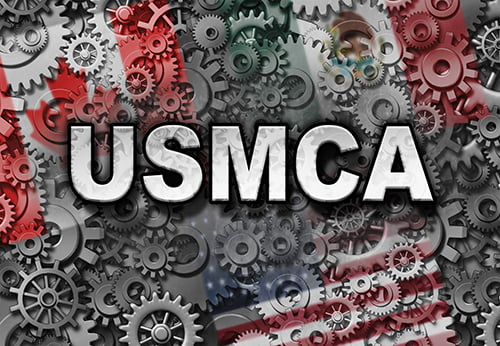
A product manufactured today that is eligible under the original NAFTA program may no longer be eligible under the newly negotiated trade agreement – commonly referred to as NAFTA 2.0. Karin Muller, director, customer compliance and trade governance for Magna International, and Steve Gardon, vice president, global indirect taxes and customs, Lear Corporation, who head up AIAG’s NAFTA 2.0 Workgroup, will present an important session on what they describe as the “ABCs of USMCA” and the differences between it and NAFTA at the upcoming AIAG Supply Chain Summit, June 18, 2019.
The session will also address what suppliers must do to prepare for the new agreement; timing of ratification; some of the pitfalls and opportunities; and finally, the increase in requirements placed on the parts sector by the vehicle assemblers so they, in turn, can meet the vehicle rules of origin.
“We need to get the message across that it will not be business as usual,” says Muller. “The agreement has changed and imposes significant new burdens on companies in the auto sector. It is important and necessary that companies work with their service provider to ensure that the rules are understood. Action is imperative.”
Muller and Gardon say the recently organized AIAG workgroup was formed as a tool for the parts sector and vehicle manufacturers to collaborate in identifying synergies in standardization, roles, responsibilities, and mutual understanding of the automotive rules of origin. “We are trying to be proactive in our attempt to avoid uncertainty, inconsistent application, and use of multiple forms,” explains Gardon.
The workgroup is trying to identify and standardize documentation to streamline the administrative burden and reduce the additional work that the new agreement will impose on the auto industry. “We are trying to standardize not only the data elements of the information, but also the documentation to be used to support the certification,” says Gardon. The workgroup is also trying to find agreement in roles and responsibilities as it relates to qualification, solicitation, steel and aluminum, and labor value content rules.
Finally, the workgroup is getting clarification from government agencies, such as the U.S. Trade Representative and Global Affairs Canada, so that all parties are on the same page in interpreting the rules, Muller and Gardon say. The team of volunteers is also evaluating the need for training.
“The workgroup is identifying processes and related challenges that did not previously exist and implications to our sector from a supplier and OEM perspective,” says Muller. “The most pressing issue currently is the identification and reporting of information to the vehicle manufacturers by the parts sector. We need to minimize, wherever we can, the additional burden that NAFTA 2 will impose on the industry.”
For more information on this important topic and others, register for AIAG’s Supply Chain Summit today.


